AAAS has long been a political body, its leadership has come solely from one political party for the last 35 years. and that means it is often going to pick and choose the science it accepts based on its political skew. But a whole lot of Democratic scientists are in biotechnology, they recognize the consensus on glyphosate and GMOs is even greater than it is climate change, and the blowback to this award announcement happened rapidly.
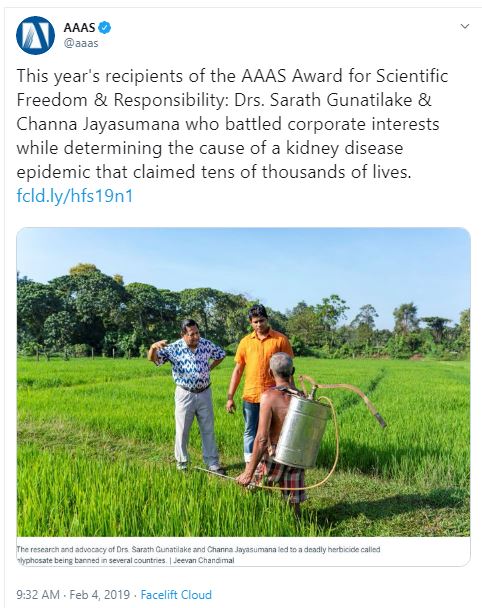
The scholars "battled corporate interests"? No corporation is promoting unclean water, companies didn't even know about the paper until after it was published. No scientists are against clean water, not at any place I can find. It was a ridiculous hyperbolic advocacy rant and the outrage by biologists to this latest affront on their field was immediate. Soon enough AAAS took down the page. (1)
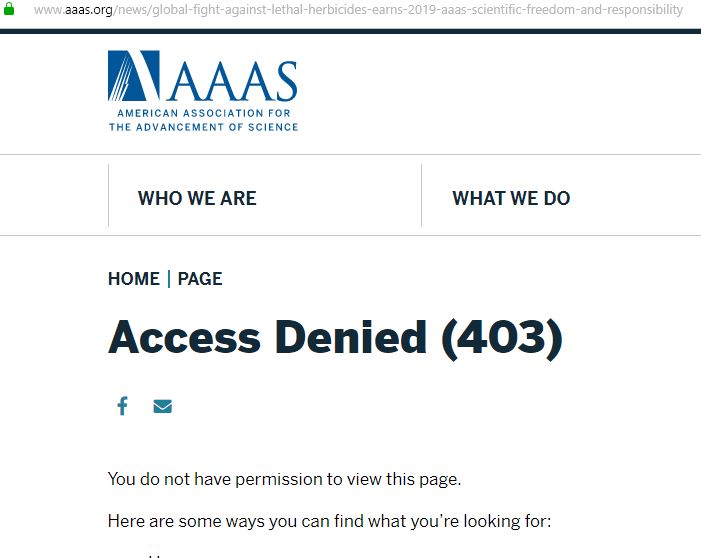
After conducting an internal review - like NBC did, of its sexual harassment charges against Matt Lauer and others, to put the value of internal reviews in context - they decided that the award was just fine, and just wanted to stress that the recipients did not prove a causal link, they only suggested it. And now they didn't battle corporate interests, they persevered under challenging circumstances.

What were the challenging circumstances? No one tried to stop them from publishing it. This is as bizarre as claiming they had to "battle" corporations to get published. It's nonsense.
In 2014 they published a paper asking if there was a link between a mystery compound in "hard water" and kidney disease. They then used the same statistical correlation you can use to suggest autism is caused by organic food.(2) They even put a question mark in the title. They noted that actual experts say the connection between hard water and kidney disease is not there. They nonetheless speculate it could be due to unknown Compound X and since glyphosate is the most common herbicide in the world they leap to claiming that's probably it.
It wasn't a very interesting paper, unless you are a trial lawyer or an IARC panel member being paid by a trial lawyer. The Sri Lankan National Academy of Science was as surprised by the speculative tone as trial lawyers and wrote, "We are not aware of any scientific evidence form studies in Sri Lanka or abroad showing that CKDu is caused by glyphosate."
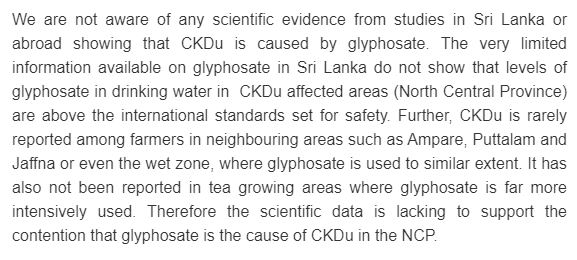
Their concern about the scientific rigor of the paper is warranted. Are we to believe farmers in one region of one country evolved differently than another and grew a pathway otherwise only found in plants? Where are the dead bodies if that is so? Where is the epidemic AAAS claimed these two scholars uncovered?
And why did AAAS suggest death threats the authors say they received came from corporations because the authors were supposedly "Jeopardizing the profits of glyphosate distributors, subsidiaries and importers"? And who gives out science awards for suggesting something might be scientifically true rather than showing it?
Apparently AAAS, who have long insisted Science Is A Vast Corporate Conspiracy, but the dirty secret they try to hide is that many of their science positions conveniently only go after the science accepted by a particular demographic yet denied by their in group. Science at the publisher of Science is not a corporate conspiracy, it is a political blanket. Who represents the greatest purchasing power of "organic" food, supplements, and alternatives to vaccines? Data have the answer. It's Democrats, that was obvious even a decade ago, when 80 percent of the counties that had a Whole Foods voted for the political party of AAAS, and those were the same wealthy counties that had rampant vaccine denial and denial of the science behind nuclear energy and natural gas and bought alternatives to medicine.
Okay, so what? America has political divides, we all know that. It wasn't always the case when it came to science. We didn't have the trust divide about science 40 years ago precisely because science organizations hadn't lurched to one political side and stopped being trusted guides for the public.(3)
AAAS ongoing political partisanship has created public distrust of all science
Partisanship is harmful when it is an organization with Advancement of Science in its name. If we want to know why more Republicans than Democrats deny climate change, it is because of organizations with political agendas suggesting that scientists on the side of their war against chemistry or energy science "battled corporate interests" when there is zero evidence that's true.
Why should the public trust scientists on global warming when they are told by AAAS that biology has been hijacked by corporate interests? Monsanto had less revenue per year than Whole Foods, so how were they able to buy off biologists when Exxon, with 20X the revenue of Monsanto, was not able to buy off climate scientists?
It doesn't have to make any sense, it's politics adopting a veil of science. It's AAAS.
But if academics suggest that scientists at Exxon are corporate shills, and AAAS plays to that conspiracy tale, why should the public trust academics either? Aren't academics controlled by government funding?
AAAS has a long history of undermining biology
Leon Lederman ("Biology Last" in education) and paleontologist Stephen Jay Gould (Darwin was wrong) are just two of the more overt detractors that have made undermining life sciences prominent enough in their public work to get handed the top spot at the publisher of Science magazine.
And this is not the first time one of these Scientific Freedom and Responsibility awards went to a political agenda rather than a scientific effort.
Nothing was hyped like lead in water in Flint, Michigan, for example, yet everyone had concern. However, the moment activists started able to somehow blame a Republican, AAAS handed an award to one of the people who detected the problem. Okay, nothing wrong with that, but the hysteria it created - activists and their friends inside AAAS leadership reformulated 'we don't know the safe level of lead in water' to mean 'any lead in water causes brain damage' - set off an irresponsible panic. The exact thing science is not supposed to be doing. The award before that went to an activist for banning guns, a little weird for a science organization. Anti-military posturing won before that. Then Fukushima, as if we didn't know a tsunami hit there, but it gave American Democrats and therefore AAAS a way to promote their fear of, you guessed it, nuclear science.
Obviously those are not all the fault of current Democrat-in-Charge Rush Holt, he only took over AAAS in 2015. While it's true he could not have gotten the job if he were not a Democrat, they were ideologically suspect even when I was a kid, because they brought in the author of Ecoscience (written with fellow Population Bomb doomsday prophet Paul Ehrlich) to run the group. John Holdren was quite literally someone who felt like a world government and mandatory sterilization were needed to stave off famine. Who would be the people most likely to be sterilized in that communist-style One Child Policy? You probably know enough eugenics to know that progressives were always self-selecting rich, white elites, and that did not change by the 1980s. But with overt eugenics out of favor due to that Hitler guy, they turned to limiting the food supply in the 1990s - by declaring war on the same agricultural biology they insisted was going to fail us in the 1960s and '70s. They declared war on agricultural science because it didn't fail.
Holdren was the choice of President Obama and during his administration Democrats put forth a bill in Congress to place warning labels on GMOs - which can be used to make plants resistant to the same herbicide glyphosate AAAS opposes - and before that they even tried to keep NIH from mandating that science studies funded by NIH be published "open access" so they could be read by the public. Little surprise there, AAAS makes millions each year getting taxpayer-funded research and somehow copyrighting it so the public can't read it without paying fees to AAAS.
Some of this insouciance about letting AAAS drift to the fringe can be dismissed because biologists, both academic and private sector, have to be under one of two tents when it comes to politics in America. Yet by blindly continuing to pay fees to AAAS biologists are not making changes from the inside, which some rationalize as the reason for staying, they are simply feeding the denial machine. By allowing AAAS to demonize "corporate" scientists (and intimating those scientists are working at places that issue death threats if someone writes a speculative statistical correlation paper critical of a product), biologists are allowing them to undermine trust in all biology. Go ahead and vote for Democrats next November, but they should vote with their wallets right now and stop giving money to AAAS until it makes a real change. They need to go back to promoting science for all Americans, not just those in the party of their executives.
NOTE:
The press release in full:
Global Fight Against Lethal Herbicides Earns 2019 AAAS Scientific Freedom and Responsibility Award
4 February 2019, Adam D. Cohen Office of Public Programs 2019 AAAS Annual Meeting Newsroom
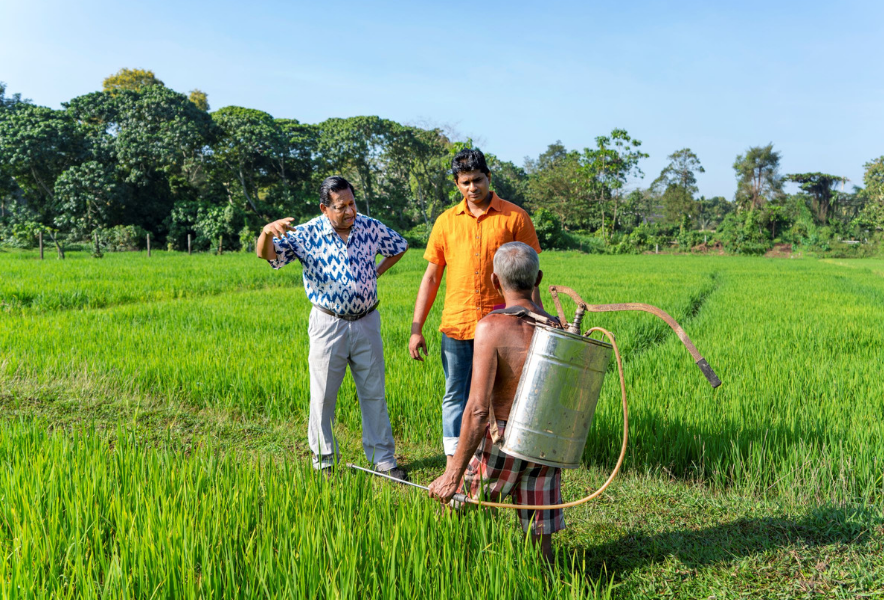
The research and advocacy of Drs. Sarath Gunatilake and Channa Jayasumana led to a deadly herbicide called glyphosate being banned in several countries. | Jeevan Chandimal
Two public health researchers who battled powerful corporate interests to uncover the deadly effects of industrial herbicides, solving a medical mystery and protecting the health of farming communities across the world, will receive the 2019 Scientific Freedom and Responsibility Award from the American Association for the Advancement of Science.
Drs. Sarath Gunatilake and Channa Jayasumana faced death threats and claims of research misconduct while working to determine the cause of a kidney disease epidemic that has claimed tens of thousands of lives in their home country of Sri Lanka and around the world. Ultimately, their advocacy led to the culprit, an herbicide called glyphosate, being banned in several affected countries.
“To right a wrong when significant financial interests are at stake and the power imbalance between industry and individual is at play takes the unique combination of scientific rigor, professional persistence and acceptance of personal risk demonstrated by the two scientists recognized by this year’s award,” says Jessica Wyndham, director of the Scientific Responsibility, Human Rights and Law Program at AAAS.
Beginning around 1994, rice farmers in Sri Lanka’s North Central Province began falling ill with Chronic Kidney Disease. The epidemic was unique in that those succumbing to the disease were relatively young and did not suffer from ailments associated with CKD, such as diabetes and hypertension. In 2011, the country’s Ministry of Health invited Gunatilake, a physician and researcher at California State University, Long Beach to investigate the cause of the disease.
At the time, Jayasumana, also a physician, was struggling to find funding to research the CKD epidemic for his doctoral degree at Rajarata University, in North Central Province. He decided to join California State University, Long Beach as a visiting scholar under Gunatilake’s supervision, bringing with him samples of urine, drinking water and rice. Gunatilake and Jayasumana found that glyphosate, marketed mostly by Monsanto as Roundup, was transporting arsenic, cadmium and other heavy metals to the kidneys of those drinking contaminated water, causing CKD.
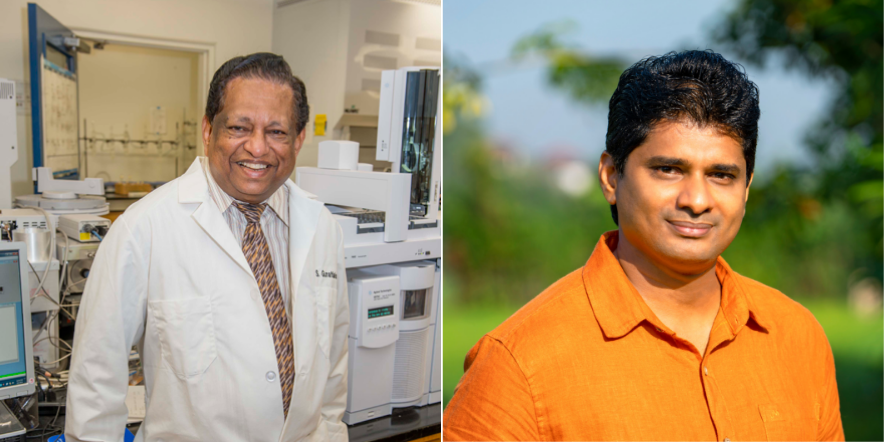
Gunatilake and Jayasumana found that glyphosate was transporting heavy metals to the kidneys of those drinking contaminated water, causing CKD. | Courtesy of pictured
In 2014, they published their results in the International Journal of Environmental Research and Public Health. Because similar epidemics were occurring in Central America, North Africa and Southeast Asia, the study earned worldwide attention. To date, the paper has received 23,000 downloads and 64 citations.
Jeopardizing the profits of glyphosate distributors, subsidiaries and importers, however, did not come without consequences. Gunatilake and Jayasumana received death threats, and twelve scientists who had obtained industry-funded grants filed a research misconduct complaint against Gunatilake. Eventually, he was exonerated, after a California State University, Long Beach scientific investigation panel dismissed the complaint.
Thanks to pressure applied by a massive public health campaign led by Gunatilake, the Sri Lankan president created the National Project for Prevention of Kidney Diseases, naming Jayasumana as director. In 2015, Sri Lanka became the first of many countries to ban the import of glyphosate. Three years later, Sri Lanka lifted the import ban, but continued to restrict the use of glyphosate on tea and rubber plantations.
In the past few years, Gunatilake has convened multi-disciplinary international conferences to discuss the dangers of glyphosate and raised more than $20,000 to help the families of victims. CKD has claimed the lives of at least 25,000 Sri Lankans and 20,000 Central Americans.
“What started as a bold effort to provide a voice for the impoverished, powerless rice paddy farmers in Sri Lanka has now blossomed into a worldwide environmental movement through research, advocacy, networking and collaboration,” wrote public health professional Hanan Obeidi in the award nomination letter.
The AAAS Scientific Freedom and Responsibility Award was established in 1980. It honors scientists, engineers or organizations whose exemplary actions have demonstrated scientific freedom and responsibility in challenging circumstances. Achievements that the award recognizes include acting to protect the public’s health, safety or welfare; focusing public attention on important issues related to scientific research, education and public policy; and establishing important new precedents in carrying out the social responsibilities of scientists or in defending the professional freedom of scientists and engineers. The award consists of a $5,000 prize and a commemorative plaque.
The awardees will receive the prize during the 185th AAAS Annual Meeting in Washington, D.C., on Feb. 15, 2019.
(2)
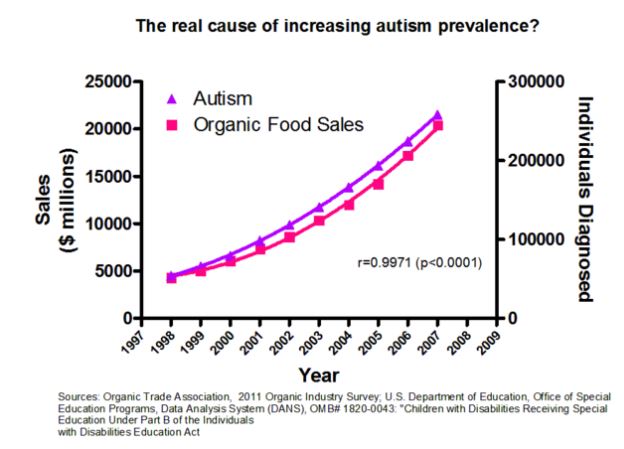
(3) SUNY-Albany's Ron McClamrock put it the way many Democrats (and 94 percent of academic biology votes Democrat) feel: "Lefties are overrepresented in academia because on average, we're just f-ing smarter."




Comments